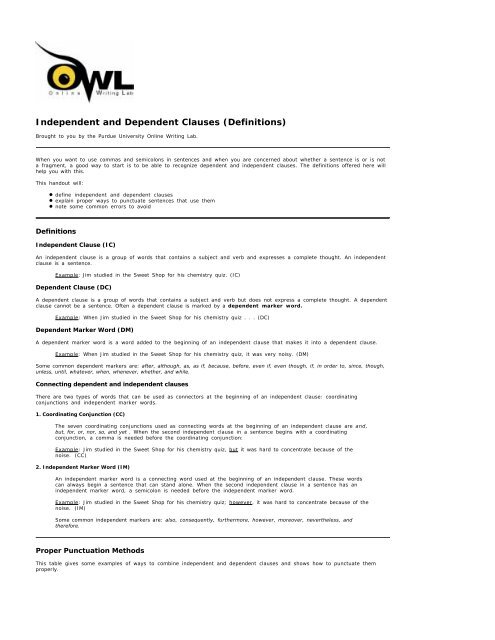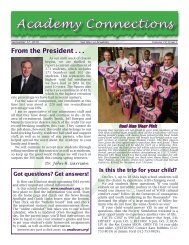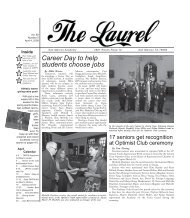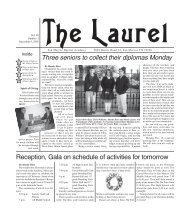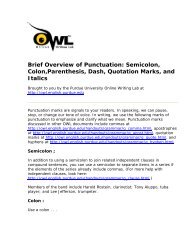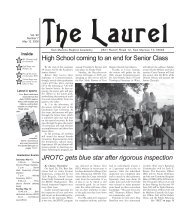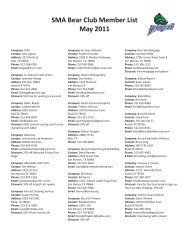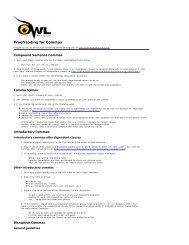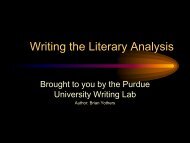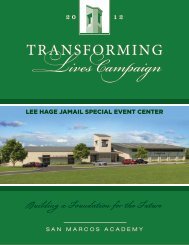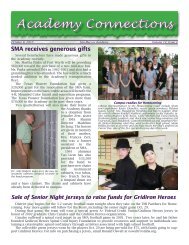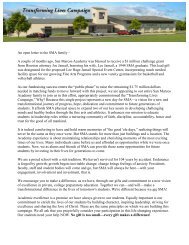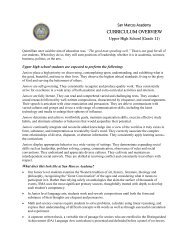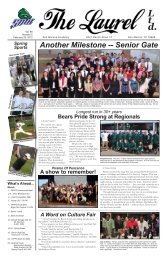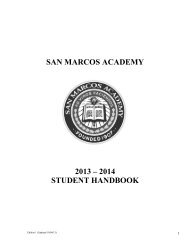Independent and Depend
Independent and Depend
Independent and Depend
You also want an ePaper? Increase the reach of your titles
YUMPU automatically turns print PDFs into web optimized ePapers that Google loves.
<strong>Independent</strong> <strong>and</strong> <strong>Depend</strong>ent Clauses (Definitions)<br />
Brought to you by the Purdue University Online Writing Lab.<br />
When you want to use commas <strong>and</strong> semicolons in sentences <strong>and</strong> when you are concerned about whether a sentence is or is not<br />
a fragment, a good way to start is to be able to recognize dependent <strong>and</strong> independent clauses. The definitions offered here will<br />
help you with this.<br />
This h<strong>and</strong>out will:<br />
define independent <strong>and</strong> dependent clauses<br />
explain proper ways to punctuate sentences that use them<br />
note some common errors to avoid<br />
Definitions<br />
<strong>Independent</strong> Clause (IC)<br />
An independent clause is a group of words that contains a subject <strong>and</strong> verb <strong>and</strong> expresses a complete thought. An independent<br />
clause is a sentence.<br />
Example: Jim studied in the Sweet Shop for his chemistry quiz. (IC)<br />
<strong>Depend</strong>ent Clause (DC)<br />
A dependent clause is a group of words that contains a subject <strong>and</strong> verb but does not express a complete thought. A dependent<br />
clause cannot be a sentence. Often a dependent clause is marked by a dependent marker word.<br />
Example: When Jim studied in the Sweet Shop for his chemistry quiz . . . (DC)<br />
<strong>Depend</strong>ent Marker Word (DM)<br />
A dependent marker word is a word added to the beginning of an independent clause that makes it into a dependent clause.<br />
Example: When Jim studied in the Sweet Shop for his chemistry quiz, it was very noisy. (DM)<br />
Some common dependent markers are: after, although, as, as if, because, before, even if, even though, if, in order to, since, though,<br />
unless, until, whatever, when, whenever, whether, <strong>and</strong> while.<br />
Connecting dependent <strong>and</strong> independent clauses<br />
There are two types of words that can be used as connectors at the beginning of an independent clause: coordinating<br />
conjunctions <strong>and</strong> independent marker words.<br />
1. Coordinating Conjunction (CC)<br />
The seven coordinating conjunctions used as connecting words at the beginning of an independent clause are <strong>and</strong>,<br />
but, for, or, nor, so, <strong>and</strong> yet . When the second independent clause in a sentence begins with a coordinating<br />
conjunction, a comma is needed before the coordinating conjunction:<br />
Example: Jim studied in the Sweet Shop for his chemistry quiz, but it was hard to concentrate because of the<br />
noise. (CC)<br />
2. <strong>Independent</strong> Marker Word (IM)<br />
An independent marker word is a connecting word used at the beginning of an independent clause. These words<br />
can always begin a sentence that can st<strong>and</strong> alone. When the second independent clause in a sentence has an<br />
independent marker word, a semicolon is needed before the independent marker word.<br />
Example: Jim studied in the Sweet Shop for his chemistry quiz; however, it was hard to concentrate because of the<br />
noise. (IM)<br />
Some common independent markers are: also, consequently, furthermore, however, moreover, nevertheless, <strong>and</strong><br />
therefore.<br />
Proper Punctuation Methods<br />
This table gives some examples of ways to combine independent <strong>and</strong> dependent clauses <strong>and</strong> shows how to punctuate them<br />
properly.
IC. IC.<br />
IC; IC.<br />
IC, CC IC.<br />
IC; IM, IC.<br />
DC, IC.<br />
IC DC.<br />
I went to the store. I didn't buy any bread.<br />
I went to the store; I didn't buy any bread.<br />
I went to the store, but I didn't buy any bread.<br />
I went to the store; however, I didn't buy any bread.<br />
When I went to the store, I didn't buy any bread.<br />
I didn't buy any bread when I went to the store.<br />
Some Common Errors to Avoid<br />
Comma Splices<br />
A comma splice is the use of a comma between two independent clauses. You can usually fix the error by changing the comma<br />
to a period <strong>and</strong> therefore making the two clauses into two separate sentences, by changing the comma to a semicolon, or by<br />
making one clause dependent by inserting a dependent marker word in front of it.<br />
Incorrect: I like this class, it is very interesting.<br />
Correct: I like this class. It is very interesting.<br />
Fused Sentences<br />
(or ) I like this class; it is very interesting.<br />
(or) I like this class <strong>and</strong> it is very interesting.<br />
(or ) I like this class because it is very interesting.<br />
(or ) Because it is very interesting, I like this class.<br />
Fused sentences happen when there are two independent clauses not separated by any form of punctuation. This error is also<br />
known as a run-on sentence. The error can sometimes be corrected by adding a period, semicolon, or colon to separate the two<br />
sentences.<br />
Incorrect : My professor is intelligent I've learned a lot from her.<br />
Correct: My professor is intelligent. I've learned a lot from her.<br />
Sentence Fragments<br />
(or ) My professor is intelligent; I've learned a lot from her.<br />
(or ) My professor is intelligent <strong>and</strong> I've learned a lot from her.<br />
(or ) My professor is intelligent; moreover, I've learned a lot from her.<br />
Sentence fragments happen by treating a dependent clause or other incomplete thought as a complete sentence. You can<br />
usually fix this error by combining it with another sentence to make a complete thought or by removing the dependent marker.<br />
Incorrect: Because I forgot the exam was today.<br />
Correct: Because I forgot the exam was today, I didn't study.<br />
(or ) I forgot the exam was today.<br />
Related Materials on OWL<br />
Run-Ons, Comma Splices, Fused Sentences (http://owl.english.purdue.edu/h<strong>and</strong>outs/grammar/g_sentpr.html)<br />
Sentence Variety (http://owl.english.purdue.edu/h<strong>and</strong>outs/general/gl_sentvar.html)<br />
Using Commas (http://owl.english.purdue.edu/h<strong>and</strong>outs/grammar/g_comma.html)<br />
The following information must remain intact on every h<strong>and</strong>out printed for distribution.<br />
This page is located at http://owl.english.purdue.edu/h<strong>and</strong>outs/print/grammar/g_clause.html<br />
Copyright ©1995-2001 by OWL at Purdue University <strong>and</strong> Purdue University. All rights reserved.<br />
Use of this site, including printing <strong>and</strong> distributing our h<strong>and</strong>outs, constitutes acceptance of our terms <strong>and</strong> conditions of fair use,<br />
available at<br />
http://owl.english.purdue.edu/lab/fairuse.html.<br />
To contact OWL, please visit our contact information page at<br />
http://owl.english.purdue.edu/lab/contact.html to find the right person to call or email.


